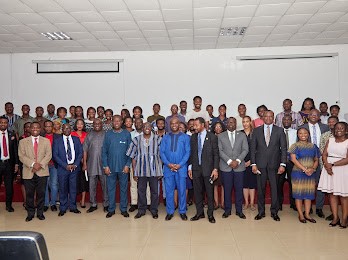Ghana Institute of Management and Public Administration (GIMPA) has held a conference with a call for a national action plan to protect businesses and human rights in Ghana to meet the Sustainable Development Goals (SDGs) in growing the economy of Ghana.
The establishment and the implementation of long-term national action plan would help redress perennial issues confronting the country for economic growth and the protection of human rights.
The event, dubbed ‘Realising Sustainable Development Goal, the Role of Responsible Businesses’, had funding from DANIDA through the Danish Institute for Human Rights. The event was to educate the public on research conducted by GIMPA in collaboration with partners on the role played by private sector responsible business initiatives in the attainment of the United Nations’ Sustainable Development Goals.
The conference focused on the decent work in the artisanal mining industry in Ghana, where the research investigated compliance with the decent work objective under SDG 8 that sought to ascertain initiatives adopted in the artisanal mining industry to address the issue of decent labour and what could be done to better the working conditions in that industry.
It was also on child labour in the cocoa industry in Ghana which focuses on private sector responsible business initiatives aimed at eliminating child labour in the cocoa industry Ghana where the research investigated how such private sector initiatives can serve as non-legal approaches to compliance with domestic and international laws prohibiting child labour.
More so, it was on non-judicial remediation of private sector human rights abuses in Ghana where the research investigated processes and procedures used in the private sector to address issues of work-related human rights abuses outside the traditional judicial system as well, and on national action plans (NAPs) on business and human rights in Ghana, focusing on the work of a national framework to establish an action plan for business and human rights.
Deputy Chairperson of the National Commission for Civic Education Victor Brobbey said there is a need for a framework that allows citizens within the country to hold companies responsible for right violations.
The United Nations’ human rights were essentially created to allow states to use the guideline to conduct a baseline assessment to address issues affecting citizens at the workplaces and businesses, he said.
He said the SDG is a universal call to transform all countries, of which businesses play active role in the implementation of the SDGs and therefore requires all hands on deck to play significant roles in the realisation of the goals to protect the fundamental human rights and businesses to grow the economy.
Danish Ambassador to Ghana Tom Norring commended the institute for churning out quality graduates and establishing a research centre to help in addressing issues affecting citizens within and the disapora in achieving the SDGs. “We need to develop a policy to provide decent jobs for the youth while in school to curb the unemployment and poverty rates,” he said.
Chief Executive Officer of Ghana Cocoa Board Dr. Joseph Boahene Aidoo said the policy to protect human rights of cocoa farmers has been implemented to ensure children within pursue education while families acquire decent works to cater for the family.
Rector of GIMPA Prof. Samuel Bonsu said the institute was committed toward collaborating with researchers to come out with issues affecting the economy for redress. The conference, he noted, also provided an opportunity to share some research findings with the world.
A lecturer at the University of Derby-UK, Dr. Alex Ansong, said one of the research works was to ascertain initiatives adopted in the artisanal mining industry to address the issues of decent labour and what could be done to better the working conditions.










